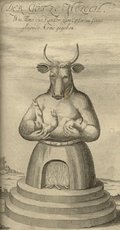TestMain
From Plastic Tub
| Revision as of 22:45, 14 May 2005 Undule (Talk | contribs) ← Go to previous diff |
Revision as of 22:45, 14 May 2005 Undule (Talk | contribs) Go to next diff → |
||
| Line 18: | Line 18: | ||
| <td width="16%" align="left" valign="top" style="line-height: 12px;"><font size="1"> | <td width="16%" align="left" valign="top" style="line-height: 12px;"><font size="1"> | ||
| == UPDATED == | == UPDATED == | ||
| - | ---- | + | |
| [[Image:Molech.jpg|center|120px]] | [[Image:Molech.jpg|center|120px]] | ||
Revision as of 22:45, 14 May 2005
| Plastic Tub is a repository of lore and history regarding the Accidental Associationalist movement, its activities, major players and splinter movements. All of the information herein has been supplied by amateur historians and participants of the group. While every effort has been made to preserve the accuracy and integrity of the information, please bear in mind that the wiki format allows anyone to change and update entries. Thus we advise all researchers that while Plastic Tub is a good starting point for your work, it should not be considered an infallible authority on any subject. Every effort should be made to verify and cross-check information contained in this site. Plastic Tub is not responsible for any errors or omissions in this site or the effects these errors may have on your personal projects. |
UPDATED
In speaking of Molech one must be aware of the distinction between the general phenomena of Molechianism and the particular name itself as it refers to the Semitic manifestation. In Biblical Canaan, Molech -- or Moab, Ba’al – was worshipped as the Lord of Fire and God of War. The name itself is generally understood to mean “King” or, more generally, “owner.” Though most closely associated with Hebriac tradition, Molech .. |
In speaking of Molech one must be aware of the distinction between the general phenomena of Molechianism and the particular name itself as it refers to the Semitic manifestation. In Biblical Canaan, Molech -- or Moab, Ba’al – was worshipped as the Lord of Fire and God of War. The name itself is generally understood to mean “King” or, more generally, “owner.” Though most closely associated with Hebriac tradition, Molech .. | <flash>
<object classid="clsid:D27CDB6E-AE6D-11cf-96B8-444553540000" codebase="http://download.macromedia.com/pub/shockwave/cabs/flash/swflash.cab#version=6,0,29,0" width="309" height="214"> <param name="movie" value="http://www.bytescout.com/demo/swfscout_Shapes.swf"> <param name="quality" value="high"> <embed src="http://www.vaporslave.com/blogflash/UnderFActs.swf" quality="high" pluginspage="http://www.macromedia.com/go/getflashplayer" type="application/x-shockwave-flash" width="175" height="200"> </embed> </object> </flash> Pigs and Sex Raw mountain oysters smell remarkably like truffles. Boars ejaculate a pint of semen during half-hour long orgasms. A boar with no testicles is called a barrow. Pigs and Religion | Easily the most understood of groups secreting themselves away from direct observation, the League fashions itself after Minoan Craft Ritual, Fornication Timetables and late-style arithmetical pant-fashions -- at least in so much as the latter represents a conquering fashion, a being made of spaces between fingers five -- and in that failure is a layer of experience, as the Hand too removes sensation |
In speaking of Molech one must be aware of the distinction between the general phenomena of Molechianism and the particular name itself as it refers to the Semitic manifestation. In Biblical Canaan, Molech -- or Moab, Ba’al – was worshipped as the Lord of Fire and God of War. The name itself is generally understood to mean “King” or, more generally, “owner.” Though most closely associated with Hebriac tradition, Molech ... |
In speaking of Molech one must be aware of the distinction between the general phenomena of Molechianism and the particular name itself as it refers to the Semitic manifestation. In Biblical Canaan, Molech -- or Moab, Ba’al – was worshipped as the Lord of Fire and God of War. The name itself is generally understood to mean “King” or, more generally, “owner.” Though most closely associated with Hebriac tradition, Molech .. |


